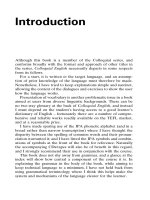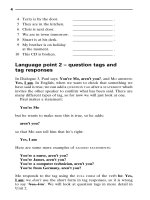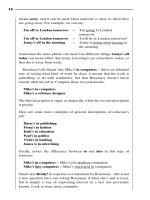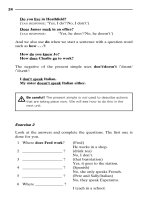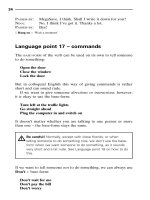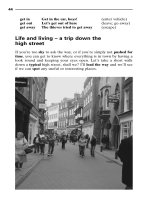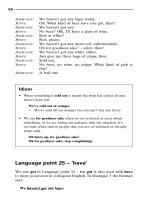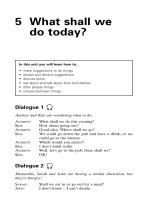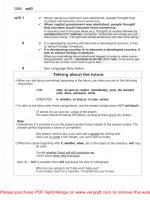Tài liệu A complete English language course part 21 pdf
Bạn đang xem bản rút gọn của tài liệu. Xem và tải ngay bản đầy đủ của tài liệu tại đây (86.19 KB, 10 trang )
• We always use the
PRESENT PERFECT
or the
PRESENT PERFECT
CONTINUOUS
with since, not the present or present continuous.
• With for we use the
PRESENT PERFECT
or
PRESENT PERFECT
CONTINUOUS
, or the
PAST SIMPLE
– but there is a difference in
meaning:
(a) Dave’s lived
in Brighton for three years
(and he still lives there now)
(b) Dave lived
in Brighton for three years
(some time in the past – he doesn’t live there now)
Sentence (a) uses the present perfect, because it describes a period
of time that started in the past but has continued to the present and
has not finished. Sentence (b) uses the past simple, because it
describes a period of time that started and finished in the past.
Exercise 4
Complete these sentences using for or since.
1 Dave’s lived in Heathfield ____ last July.
2 We haven’t see Gerry ____ at least two years.
3 Justine’s been at the dentist’s ____ ages.
4 My car’s been in the garage ____ a week.
5 These people have been waiting ____ four o’clock
6 This parcel’s been here ____ last week.
7 We’ve been coming here every year ____ 1997.
8 I’ve waited here ____ an hour, and now I’m leaving!
9 This place has changed a lot ____ we were here last.
10 I’ve been learning English ____ a long time.
Exercise 5
Choose the correct verb from the brackets for each sentence – the
first one has been done for you.
1 We (live
/’ve lived) here since December 1999.
2 I (lived/’ve lived) in Italy for three months in 1988.
3 Suzie (’s been learning/’s learnt) French since last year.
184
4 How long (have you been working/have you worked) in the
garden today?
5 We (haven’t seen/didn’t see) Fiona since yesterday.
6 (Have you been/Are you) waiting here long?
7 I (learn/’ve been learning) English for five years.
8 The kids (are/have been) playing football since ten o’clock.
Dialogue 4
Niels, Dave and Julie are talking about the last time Niels came over
from Denmark to visit.
N
IELS
: Do you remember when I came over to visit last year?
D
AVE
: Of course I do! You arrived in the evening after
coming over on the ferry and driving straight here.
When exactly was it?
N
IELS
: I think it was in April, wasn’t it? It was definitely some
time in spring.
J
ULIE
: Yes, you’re right. It was Eli’s birthday while you were
here, and that’s on the 9th of April, so it was in the
Easter holiday.
N
IELS
: And then I went upstairs and slept for a bit to recover
from the journey . . .
D
AVE
: . . . and while you were asleep Julie phoned up Ronnie
and Fifi and invited them round . . .
J
ULIE
: . . . and then an hour later when Ronnie and Fifi
turned up I woke you up, and we stayed up with them
till the early hours drinking wine.
D
AVE
: And we ended up singing rude songs.
N
IELS
: You all did – I was asleep again by the time you all
started singing.
J
ULIE
: Just as well you were – they were very rude songs.
D
AVE
: I know – why don’t I ask Ronnie and Fifi round again
tonight?
N
IELS
: Why not? And this time I’ll try and stay awake!
1111
2
3
4
5
6
7
8
9
10
11
1211
13
14
15
16
17
18
19
20
21
22
23
24
25
26
27
28
29
30
31
32
33
34
35
36
37
38
39
40
41
4211
185
Language point 68 – more time
expressions
We met a lot of time expressions in Language point 39, using
general words such as day, night and year. We also use months,
seasons and festivals to talk about when things happen. Be careful
with the different
PREPOSITIONS
:
in
April
winter
the Christmas holidays
the evening
at
Christmas
the end of April
the weekend
the beginning of (the) winter
(no preposition) next Christmas
last April
an hour later
this summer
We will look at months, seasons and festivals at the end of this unit.
Exercise 6
Fill in the blanks in Henry’s account of past and future holidays,
using the words from the box. You can only use each word once.
_____ April we went _____ holiday to the Caribbean. We
often go _____ the end _____ the spring because the
186
Idioms
• for a bit means ‘for a short period of time’
• till the early hours means ‘until early in the morning, but while it
is still dark’
• just as well means ‘it was a good thing’ or ‘it was lucky’
weather’s just right over there _____ that time of the year.
We arrived _____ the airport and _____ hour later we were
_____ our villa in the mountains. In the evening we went
_____ and had a Caribbean meal. We had a lovely time _____
the sun, and we’re going to go again _____ summer.
Next year we’re going _____ New Zealand, _____ the
Christmas holidays. We’ll have to leave _____ the middle
_____ the night to get to the airport, and the trip’ll last _____
twenty-four hours. I’m looking forward _____ seeing my
relatives _____ Wellington. We’ll probably stay _____ several
weeks – I expect we’ll come back to the UK _____ the end
of January.
in next in nearlyat
of an on out at
in at for to of
in at last in to
Language point 69 – a-adjectives
We learnt about
STATE VERBS
in Language point 45 – go back and
look at this again if you need to before reading through this
Language point.
In English we also have a small number of
ADJECTIVES
that
describe physical and mental
STATES
. They all have an a- prefix, and
are stressed on the second syllable:
asleep /ə`slip/ aware /ə`wεə
r
/
awake /ə`wεik/ alive /ə`lɑv/
afraid /ə`frεid/ alike /ə`lɑik/
alone /ə`ləυn/ ashamed /ə`ʃεimd/
Here’s what they mean:
be asleep = be sleeping
be awake = not be sleeping
be afraid (of something) = fear something; feel fear
1111
2
3
4
5
6
7
8
9
10
11
1211
13
14
15
16
17
18
19
20
21
22
23
24
25
26
27
28
29
30
31
32
33
34
35
36
37
38
39
40
41
4211
187
be alone = be on your own; not be with
anyone
be aware (of something) = know about something; sense
something
be alive = be living; not be dead
be alike = be similar; look similar;
be the same
be ashamed (of something) = feel guilty about something
you’ve done
Here are some examples:
Are you aware of
any problems with this car?
I’m alone
in the office tomorrow – everyone else is on
holiday.
James is afraid of spiders.
Queen Victoria was still alive
in 1900.
These two girls are very alike
, aren’t they?
– Yes, they’re sisters.
Exercise 7
Put the correct a-adjective in each sentence.
1 Leasa’s very quiet upstairs – is she ______ ?
2 Dave won’t go bungee-jumping – he’s ______ of heights.
3 We need water to keep us ______ .
4 Other people disturb me, so I prefer working ______ .
188
Be careful! Most adjectives can be used before a noun:
The shirt is blue The blue shirt
but you can’t use these special
STATE
adjectives before a noun:
The cat is asleep but not ‘the asleep cat
’
The girl is afraid but not ‘an afraid girl
’
I feel rather alone but not ‘an alone person
’
ƽ

